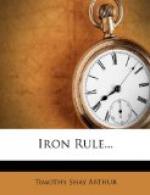Another year went by, but during all the time, no further tidings came of Andrew. To his first letter, Mrs. Howland had immediately replied, urging him, by every tender consideration, to return to his home. But she had no means of knowing whether it had ever been received. Upon her the effect of his absence had been, for a time, of the most serious character. For a few weeks after he went away, both body and mind were prostrated; to this succeeded a state of mental depression, which continued so long that her friends began to fear for her reason. Not until after the lapse of a year, when she received the above-mentioned letter from her son, did her mind attain to anything like its former state. The knowledge that he was yet, alive, that he thought of her, and still cherished her memory, gave a new impulse to her fainting spirit, and a quicker motion to the circle of life. There was yet room to hope for him. But, as time went on, there came not back even a faint echo to the voice she had sent after him, her heart failed her again. Yet time, which imparts strength to all in trouble, had done its work for her also. The care and labor that ever attend the mother’s position among her children, had bent her thoughts so much away from Andrew, that, while his absence left a constant weight upon her feelings, it did not crush them down as before, into a waveless depression.
The second year of Andrew’s absence came to a close; but nothing further was heard from him. And it was the same with the third, fourth, and fifth years. In the meantime, there had been many changes in Mr. Howland’s family. Mary had married against her father’s wishes, and both herself and husband had been so unkindly treated by him on the occasion and afterward, that neither of them visited at his house.
Henry Markland, the husband of Mary, had been rather a gay young man, and this, with some other things which had come to his ears, created a prejudice in the mind of Mr. Howland against him. As to what was good in Markland, and likely to overbalance defects, he did not inquire. The hue of his prejudice colored everything. Men like Mr. Howland, who seek to bend everything into forms suited to their own narrow range of ideas, are rarely successful in attaining their ends. The principle of freedom is too deeply interwoven with all the tissues of the human mind to admit of this. From. earliest infancy there is a reaction against arbitrary power; and, those who are wise, have long since discovered that it is a much easier task to lead than force the young into right ways. Those who would truly govern children, must first learn to govern themselves. Let a parent break his own imperious will before he tries to break the will of his child; and he will be far more successful in the work he essays. to perform. But not so had Mr. Howland learned his duty in life. Without being, aware of the fact, he was a domestic tyrant, and sought to establish a family despotism. And




